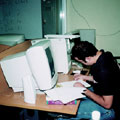

|
|
|
Appendix: Personnel & Enrollment
|



|
|||||||||||||||||||||||
|
Consistent with the institution's commitment to a liberal education, the core curriculum lays a foundation of general education in the natural sciences, social sciences, and humanities. Befitting the bicultural character of the university, the core curriculum requires that all undergraduate students undertake the study of Arabic literature, history and society. Furthermore, the core curriculum seeks to supplement the secondary school training of entering students by providing the linguistic, analytical, and study skills necessary for university work. The core curriculum carries a total of 40 hours of credit. Of these, 27 are devoted to the Core Curriculum Requirements, designed as a coherent whole and taken in sequence. All undergraduate degree students are required to complete each course within the Core Curriculum Requirements. An additional 13 credit hours provided by the Core Curriculum Electives are also required of all degree students. The Core Curriculum Electives offer a variety of courses from which undergraduates may choose. In addition to the Core Curriculum Requirements, some categories of students must take additional Arabic literature and language courses to improve their knowledge of the Arab cultural environment. Instruction in the core curriculum ranges from small seminars to regular classes to large lectures. Students also receive individual counseling. A final assessment of their work is made in each course. Some courses are given a letter grade, while others are graded on a pass/fail basis. Students who do not obtain a satisfactory standard in a course are asked to repeat it. The Core Curriculum Program is currently under revision. All changes will be described in an addendum. The Core Curriculum Requirements consist of the following courses: |
|||||||||||||||||||||||
|
|
|||||||||||||||||||||||
|
Approaches to Critical Writing (ECLT 101) Develops proficiency in critical expository writing, critical reading and greater fluency in expression. Focuses on the writing process with an emphasis on developing the student's voice, organizing and developing ideas independently within the context of academic writing. Introduces library research and use of sources. Credit: 3 hrs. Integrated Writing (ECLT 102) Develops the skills to produce effective persuasive writing with a focus on organization, content, analysis of readings, critical thinking. Provides training in the use and integration of sources, library and online research. Credit: 3 hrs. Research Writing (ECLT 103) Develops the skills to produce extended forms of academic essays and research papers with a focus on the methods of research, process of research paper writing, integration and evaluation of sources, and critical analysis. Prerequisite: ECLT 102 or its equivalent. Credit: 3 hrs. Business Communication (ECLT 320) This course focuses on the writing of professional documents, including reports, memos, business letters, and resumes. Also included is the formal presentation of professional reports. Prerequisite: ECLT 103 or its equivalent. Credit: 3 hrs. Technical Writing (ECLT 321) This course focuses on the writing of scientific and/or technical reports, memos, and technical users' documents. Particular attention is paid to technical writing in the workplace. Presentation of reports in formal settings is also covered. Prerequisite: ECLT 103 or its equivalent. Credit: 3 hrs. Placement of Students Students may be exempted from one or two courses (ECLT 102, 103) by a series of placement exams. These exams are administered by the WP during the first week of classes. Dropping Students must take the 100 level Writing Program courses as soon as they are placed into these courses and must take them in immediate sequence. Students may not drop these courses. Scientific Thinking (BIOL 120/CHEM 120/ MATH 120/ PHYS 120) emphasizes the unifying aspects of the scientific approach to the study of nature and human behavior. About one-third of the course is devoted to a discussion of the nature of scientific inquiry and investigation. The course focuses on the process of fact identification and concept formation and testing. In the remainder of the course students are exposed to applications of the approach in various disciplines. The course sets some of the major concepts and theories of science into a broad historical, philosophical, and cultural context and traces the development of these theories and concepts to their present status. This serves the double purpose of acquainting the students with the appropriate setting in which a given idea gained relevance and exposes them to the evolution of current methods of investigation. Credit: 3 hrs. Philosophic Thinking (PHIL 220) presents various types of philosophical discourse (dialectical, analytical, critical, etc.) stemming from different epochs of philosophy, and dealing with the main subjects of philosophy. It is introductory and aims to involve students in the philosophical quest. It tries to bring out the common grounding of the academic disciplines in the "desire to know" and to help students to recognize this desire as something pertaining to human nature. Philosophy is first shown in its works, and participation in these works is then invited through the communal attempt to understand them. Finally, unity is sought in variety: the spirit of philosophy is portrayed through its works. Credit: 3 hrs. Core Seminar (SEMR 200) is an interdisciplinary course in the humanities, natural sciences, and social sciences. Its goal is to foster the critical interpretation of texts. In this course, students read a variety of texts from different disciplines in an attempt to explore new ideas and new approaches to knowledge. Each week, students attend general lectures and then meet with their tutors in small groups to discuss the readings. The Seminar is an integral part of AUC's program of liberal education. By asking questions about human nature, society, culture, and the natural and supernatural worlds, students will develop their critical-analytical skills and broaden their understanding of themselves and the world in which they live. Prerequisites: PHIL 220. Credit: 3hrs. Core Honors Seminar (SEMR 300) is an interdisciplinary honors course which is an elective sequel to Core Seminar 200. The focus of Core Seminar 300 is the critical exploration of ideas stemming from a selection of texts representing a variety of cultural traditions both past and present. Because Core Seminar 300 is an honors course, students will be expected to demonstrate skills and a degree of commitment that are more advanced than those normally associated with other 300-level courses. Prerequisites: Core Seminar 200 with 3.4 overall GPA and/or consent of the Core Seminar Supervisor. Credit: 3hrs. Offered in Spring. Grading in this course is on a Pass/Fail system. To satisfy the Arab history component of the Core requirements, students must take one of the courses listed below. Credit: 3 hrs.
6. Arab Society Arab Society (SOC/ANTH 210) offers a description and analysis of social and cultural characteristics and problems of contemporary Arab society, taking into consideration the specific historical, economic, and ideological forces that shape it. Social basis for Arab unity and identity is examined and students receive an introduction to basic concepts and principles for understanding social phenomena. Credit: 3hrs. 7. Arabic Literature Students who have a Thanawiya ĎAmma certificate or its equivalent must take one course chosen from the following list of Arabic literature courses taught in Arabic:
Students should note that if they take one or both courses in English, they will be required to take certain Arabic language courses (see "Arabic Language Requirements" below). They may not take ARBS 201 with 203, or 202 with 204. Core Curriculum ElectivesThe Core Curriculum Electives consist of the following: 1.Four credit hours of natural sciences, selected from |
|||||||||||||||||||||||
|
|
|||||||||||||||||||||||
|
|
|||||||||||||||||||||||
|
|
|||||||||||||||||||||||
|
3.Three credit hours of humanities and fine arts. Students may take any course listed under Humanities (except for ARBS 201/203). For courses listed under Theater, Art, Music and Film, students may take any course at the 200, 300 or 400 level. Permission of the instructor is required for all courses. At the 300 and 400 level, written permission of the department chair is needed. 4.Three additional credit hours in any one of the above fields (i.e. natural sciences, social sciences, humanities and fine arts). The department of a student's major may require the student to take a specific course to fulfill the relevant part of the Core Curriculum Electives, namely in science, social sciences and the humanities. A student may satisfy the remainder of the Core Curriculum Electives by choosing any other relevant course, other than those from the Core Curriculum Requirements, subject to the approval of the department offering the course. The courses which have received such approval are normally shown as such in the Schedule of Courses. However, students who do not have a Thanawiya `Amma certificate or its equivalent must satisfy the Humanities requirement by passing a second Arabic literature course chosen from those listed above under Arabic Literature, section 7 of the Core requirements. Students should note that taking this course in English rather than in Arabic will oblige them to take certain Arabic language courses (see "Arabic Language Requirements" below). They may not take ARBS 201 with 203, or 202 with 204. The University is set in an Arabic-Language speaking milieu, and therefore expects each student to have an appropriate knowledge of the Arabic language. Students enter AUC with a wide variety of skills in Arabic, and mature and develop new interests while they are here. Hence it is useful to require each student to take one or two courses in Arabic language according to their level. The goal is to have everyone improve their ability to use Arabic. The options range from advanced courses focusing on special writing and reading tasks in preparation for particular careers to a basic introduction to Arabic for those who know none at all. Accordingly, all entering students, except those who have passed the Thanawiya Amma exam or equivalent, will take an Arabic placement exam. Students who have completed the Thanawiya Amma or equivalent, or who can demonstrate through this test that they have reached the intermediate level in Arabic (ACTFL Intermediate) must take one course according to their interest and level. Students who have not reached this level will be placed through testing at the appropriate level, and will take two one-semester courses. |